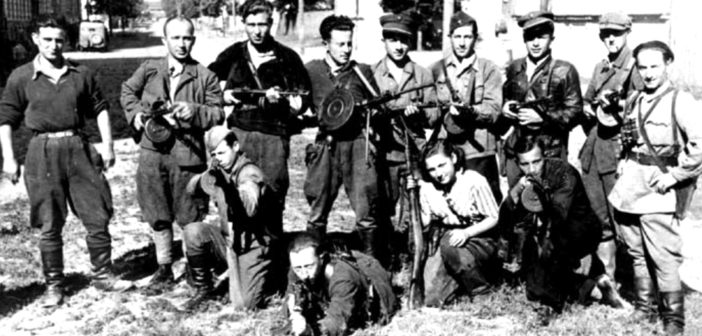When Germany invaded Eastern Europe in 1941, most believed that a sophisticated society had arrived. At that time, few believed the horrors of the Nazi war machine that had begun to be perpetrated — the few eyewitness stories were simply too unbelievable to be accepted.
However, two brothers, Shmuel and Benjamin Levin, then living in the comfort of the big city Vilna (later known as Vilnius) in Lithuania, quickly realized that an unprecedented horrific period was about to commence.
Shmuel Levin was first to leave everything behind and, with a few friends, started the first resistance group called Partisans in that region. They formed the group called The Avengers and were convinced that they would die soon, but were determined to fight to the last breath with whatever they had.
The younger Benjamin Levin, then only 12 years old, stayed behind with his sister and parents in the city and became a food smuggler, taking valuables from inside the Vilna Ghetto and crawling through the sewers under the wall and barricades to sell these precious items for food, which he then smuggled back into the Ghetto.
Nearly 80 percent of these food smugglers (almost all young children) were caught by the Germans and immediately executed.
In early 1943, Ben Levin escaped the Ghetto for the last time and went to the woods to join Shmuel Levin and the rest of the small band of Partisans. Unfortunately, when they arrived, Benjamin Levin learned that Shmuel Levin never returned from a mission that day and was presumed dead.
As a result, the Partisans allowed Benjamin Levin to stay and become the youngest Partisan at age 14. At that time, the Vilna Ghetto had 40,000 inhabitants, and a small group attempted the first Ghetto uprising. It failed, and shortly thereafter, the Nazis and their Lithuanian sympathizers killed all the Jews, except for a few hundred who survived outside the city.
Benjamin Levin fought with the Partisans until July 1944, where he helped the Jewish fighting force destroy Nazi train cars and supply lines.
With no place to go and with only his sister remaining alive from his family, the young Benjamin Levin (now 19 years old) joined various radical Zionist groups attempting to make their way to Palestine to help in the formation of the new country — ultimately called Israel.
Levin was assigned to smuggle Jews through Europe around the British Blockade of Palestine, but was caught by the Russian Army and sent to a Gulag in Siberia for one year. After his service, he made his way to southern Italy and joined the Irgun, a new organization of Zionist militants under the leadership of Menachem Begin who, much later, became the prime minister of Israel and a recipient of the Nobel Peace Prize.
In June 1948, Levin sailed as an engine room engineer on the ship Altalena for the then-newly created country of Israel with a full complement of Irgun fighters, American volunteers, 900 Holocaust survivors, primarily from the Auschwitz extermination camp, and heavy ammunition mostly donated by France.
Then, the main fighting force in Israel, the Haganah, agreed to a U.N. sponsored cease fire just a few days before the sailing of the Altalena, and the messages for it to stop arrived too late in France. The Altalena reached Israel on June 20, 1948. At that time, the Haganah demanded that the Altalena relinquish all its armaments and personnel to the newly-created Israeli Defense Forces (IDF).
When the Irgun would not relent, IDF forces lined up on the beach in Tel Aviv and fired upon the Altalena. The ship was subsequently sunk, and Levin and the other crew members were forced to swim to shore under gunfire. Thirteen Irgun personnel and nine Holocaust survivors were killed, and many others injured.
Levin succeeded in evading the shooting and entered Israel secretly. The Irgun disbanded, and Levin joined the IDF navy as it defeated the Arab armies and helped create the country of Israel. In 1951, Levin married Sara Fodor who, coincidentally, was helping the forces shooting at Levin and the Altalena three years before. Despite their political differences (and the fact that his wife almost shot her future husband), my grandparents were happily married for 63 years.
The Levin family, including the two children born in Israel, moved to the United States in 1967 in pursuit of richer economic opportunities.
Many organizations, newspaper articles and others have honored Levin, the last Partisan, for his many heroic deeds. But to me, he was the happiest, nicest person I ever met. He never thought he would live to see the age of 16, but in fact, he survived until he was 93 and, unfortunately, was overcome by COVID-19 on April 13, 2020.






Comment policy
Comments posted to The Brown and White website are reviewed by a moderator before being approved. Incendiary speech or harassing language, including comments targeted at individuals, may be deemed unacceptable and not published. Spam and other soliciting will also be declined.
The Brown and White also reserves the right to not publish entirely anonymous comments.
2 Comments
My condolences on your loss. Your grandfather has completed his long and harrowing journey RIP.
Great read sorry for your loss!!